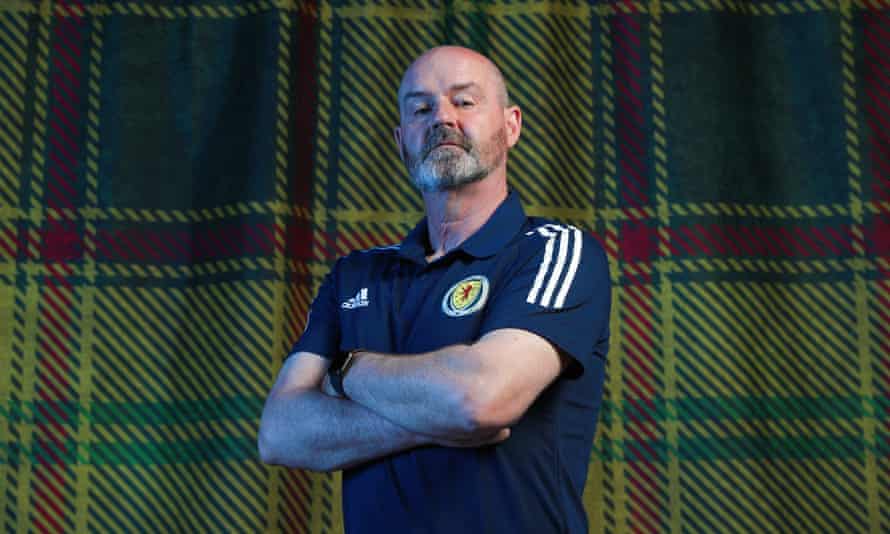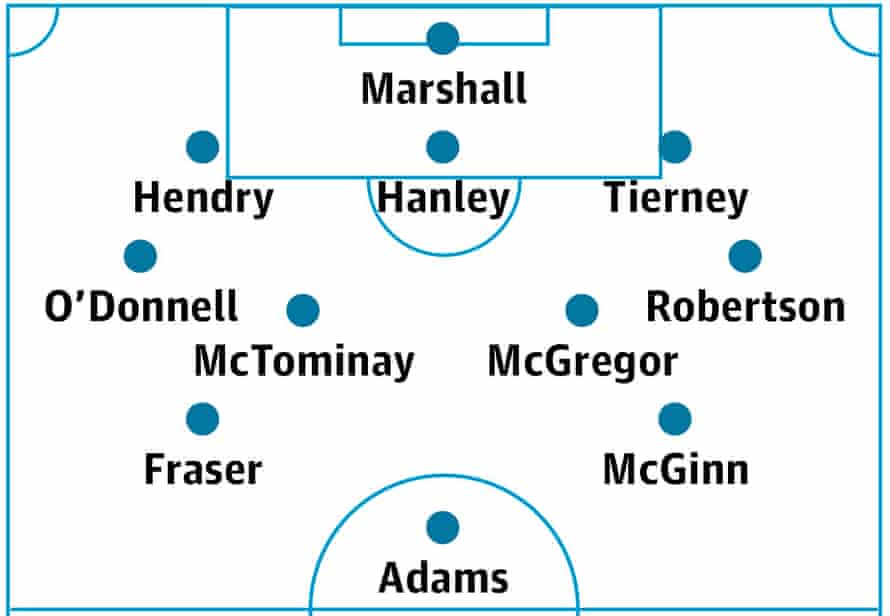This article is part of the Guardian’s Euro 2020 Experts’ Network, a cooperation between some of the best media organisations from the 24 countries who qualified. theguardian.com is running previews from two countries each day in the run-up to the tournament kicking off on 11 June.
It seems obvious to point out pragmatism is Steve Clarke’s default managerial approach. Yet it must also be remembered that Scotland do not actually have widespread attacking options of sufficient quality to play with gay abandon. Scotland have top class left-backs and an abundance of midfielders but a shortage of final-third mavericks.
Clarke’s biggest challenge has been finding roles for Andy Robertson and Kieran Tierney, both natural left-backs, in the same team. “It’s a problem more for the media, the pundits and the supporters. Not for us,” the manager insisted. His rationale? Having players of this standard is not remotely troublesome, regardless of position.
The deployment of three at the back, initially criticised by external observers, seems to have solved the conundrum. Tierney, as has been the case at Arsenal on occasion, plays at left centre-back. “I was hammered for playing three at the back and it was a big call,” Clarke admitted. “The players wanted the system to work. They were comfortable with the formation and what they were being asked to do, so we went with it.”
Ryan Jack is ruled out with a calf injury, which leaves Clarke lacking defensive midfield options. If Scott McTominay moves into that role, it removes him from the centre-back position he has been highly effective in for the Scots. This team are at their best when they hassle to retrieve possession before breaking swiftly. They do not tend to play with much attacking width; another matter due in no small part to available resource, or the lack of it.
Scotland’s lengthy wait for a finals appearance meant the how and why was forgotten amid the euphoria. A slow start to subsequent World Cup qualifying either shows a team who were content with their lot or, more likely, one that remain a long way short of lofty international standing. Clarke’s Scotland do have a strange tendency to play well for only one half of matches, as emphasised in recent outings against Israel, Austria and the Faroe Islands.
That Scotland face three teams of superior quality in their Euro 2020 group matches means further deployment of an obdurate style is inevitable. The good news for supporters is Clarke made a habit of upsetting bigger names when he was the manager of Kilmarnock. He secured a third-place finish for Killie in 2019, the key reason the Scottish FA moved for him.
“He loves working with this group of lads,” Robertson says of his international manager. If Clarke creates history again by taking Scotland to the knockout phase of a tournament for the first time, clubs will inevitably take note.
The coach
Steve Clarke appears to enjoy playing the role of a dour Ayrshireman; he can be funny and quick-witted in private but is more stoical in public. Clarke no longer plays much golf – long ago, summer breaks would include time on the fairways of Arran followed by long 19th-hole sessions – but instead fishes. The 57-year-old has lost contact with José Mourinho despite great success together at Chelsea. “He isn’t going to be that bothered about whether or not I’m keeping in touch,” insists the Scotland manager. Perhaps José could actually do with a little more Steve Clarke in his life.

Icon
Scotland lacked stars worthy of the name before Andy Robertson’s move to Liverpool and the emergence of Kieran Tierney at Celtic. That both are defenders means they are not afforded the international profile of Gareth Bale, Harry Kane or even Robbie Keane. Robertson’s story is the one that appeals. Having been freed by Celtic, he was playing for amateur side Queen’s Park and working in a supermarket before a meteoric rise that included spells at Dundee United and Hull and then Champions League and Premier League glory at Anfield. The Robertson tale is widely told in Scotland as motivation for young players who have been released by professional clubs.
Happy for a year’s delay
Che Adams was not on the Scotland scene in 2020 and there seemed little prospect of him opting to be so. Further persuasion from Steve Clarke, and the potential to start games at a major finals, led to the Southampton striker committing his international future earlier this year. After a fine season in the Premier League, Adams will look to further enhance his growing status.
Probable lineup

What the fans sing
What links The Sound of Music to the Tartan Army? Do-Re-Mi in non-doctored form was seemingly adopted by the Scotland support during a match in Austria. It remains a highly popular verse, sometimes for 10-15 minutes at a time, to the bemusement of onlookers. There is not, after all, a natural connection between the Von Trapps and Scotland’s football team. Given a trip to Wembley forms part of this finals campaign, rude songs about England will otherwise dominate.
What the fans say
“What we would give for a right-back half as good as our left-backs … ”
“Where’s the best place to pick up a large carry-out near Trafalgar Square?”
“What’s the latest with Harry Kane’s ankle?”
Pandemic hero/villain
Scott McKenna was among the “Aberdeen eight” who infamously broke lockdown rules last August, going to a bar after defeat to Rangers and earning a rebuke from the first minister, Nicola Sturgeon. In November, Andy Robertson launched his own AR26 charity to help give opportunities to young people.
Ewan Murray writes for the Guardian.
Follow him on Twitter @mrewanmurray.
For a player profile of John McGinn click here.
from Football | The Guardian https://ift.tt/3iragBc
via IFTTT

No Comment